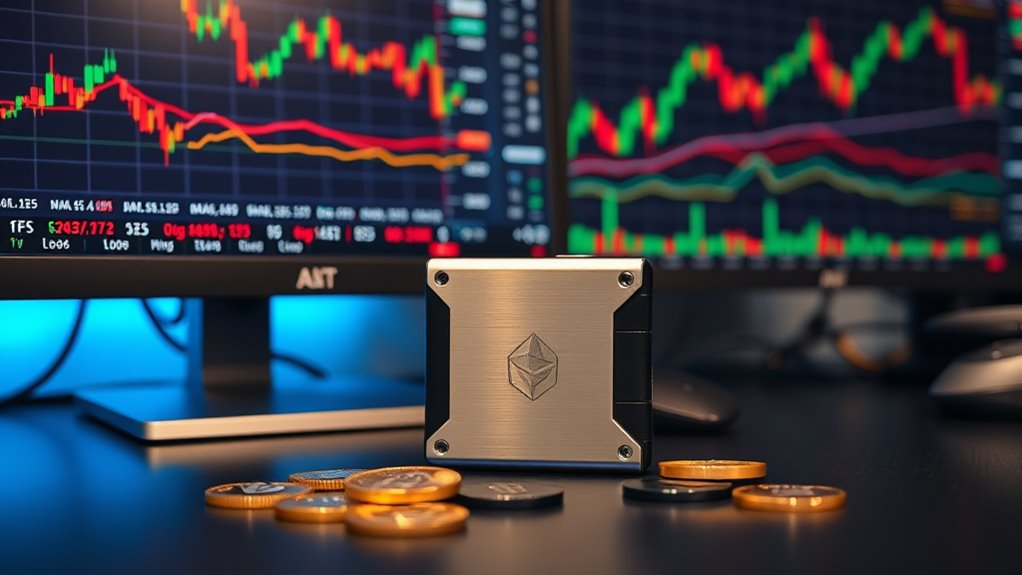Risk Management in Cryptocurrency
Note: This post may contain affiliate links, and we may earn a commission (with No additional cost for you) if you make a purchase via our link. See our disclosure for more info. The crypto world is constantly changing. This content is for informational purposes only and not financial, legal, or professional advice So, please verify the info on the cryptocurrency provider’s websites.
Risk management in cryptocurrency? It's like wearing a seatbelt in a car that swerves at 100 mph. You've got to identify, analyze, and assess risks or you might as well be playing poker blindfolded. Forget the glamour; volatility is real and can devour your capital in seconds. Use tools like stop-loss orders, diversify your portfolio, and keep your crypto safe in hardware wallets. Want to avoid chaos? There's more to uncover in this high-stakes game.

In a world where cryptocurrency can skyrocket one day and plummet the next, risk management isn't just a fancy term—it's a lifeline. Without it, investors might as well be playing poker blindfolded. The core of risk management starts with a four-step process: identification, analysis, assessment, and treatment of risks. It's not glamorous, but it's essential.
In the volatile world of cryptocurrency, risk management is your essential lifeline—navigate wisely or risk playing blindfolded.
The C-RAM framework dives deeper, looking at macroeconomic criticality, country-specific risks, and the global systemic impacts that can turn your investments into dust. Moreover, understanding the importance of market knowledge allows investors to anticipate potential risks effectively.
Then there are risk heat maps. Yes, they sound fancy, but they simply help prioritize risks with likelihood-impact matrices. Imagine a colorful chart that tells you just how much trouble you're in.
Quantitative techniques like scenario analysis and stress testing give a peek into potential future disasters, while qualitative methods like sensitivity analysis help gauge the actual impacts of those disasters. It's like preparing for a storm before it hits—nobody wants to be caught in the rain without an umbrella. Additionally, a comprehensive review of potential risks in cryptocurrency investments highlights the importance of risk identification to ensure nothing is overlooked.
Market volatility? It's a wild beast. Stop-loss orders can be your best friend, automatically closing positions when prices hit a certain point. Position sizing should keep your risk to a manageable 1-2% of capital per trade. If you're using leverage, keep it to a safe 2:1. Overleveraging? Bad idea.
Hedging strategies, like using derivatives, can offset those nasty downside risks. And for those who can't keep their hands off the buy button, automated trading algorithms can help adjust risks in real-time.
Security measures are critical. Hardware wallets offer offline storage for private keys. Multi-factor authentication? Yes, please! Choose regulated exchanges and conduct regular audits. Store the bulk of your assets in cold storage, far away from pesky hackers. Recent high-profile incidents like the Bybit exchange hack demonstrate why implementing advanced security technologies is crucial for protecting digital assets.
Finally, diversify your portfolio. Mix established coins like Bitcoin and Ethereum with emerging altcoins. Allocate across various sectors and spread investments across different blockchains. It's a tough world, but with the right risk management, you might just survive the chaos.
Frequently Asked Questions
What Are the Most Common Types of Cryptocurrency Scams?
Cryptocurrency scams are a real nightmare.
First up, there are the infamous pig butchering scams, trapping victims in fake trading platforms.
Then, you've got fake presale offerings and impersonations of legit projects.
Oh, and let's not forget those sketchy mining sites that promise riches but only end up emptying wallets.
Phishing? It's everywhere! Scammers have perfected the art of tricking people through bogus messages and websites.
Seriously, trust no one in this chaotic space!
How Can I Safely Store My Cryptocurrency Offline?
To safely stash cryptocurrency offline, one can use hardware wallets like Ledger or Trezor.
Keep them locked up tight, preferably in a fireproof safe. Avoid the temptation of wireless connections—seriously, don't!
Paper wallets work too, but generate them offline and stash copies in multiple secure spots.
Create backups. Strong passwords are a must, and don't forget to update your software.
Stay smart, stay secure, and maybe don't trust just anyone with your keys.
What Is the Impact of Regulation on Cryptocurrency Investments?
Regulation in cryptocurrency? It's a double-edged sword.
On one hand, it's supposed to clean up the mess, making the market safer and more legit. Great, right?
But hold on—compliance costs can crush small traders and startups. Some folks might even avoid investing in stricter regions.
And let's not forget, regulations can make investors jittery, leading to wild market swings.
How Do Market Trends Affect Cryptocurrency Prices?
Market trends hit cryptocurrency prices like a truck. When interest rates climb, investors flee to safer havens, leaving crypto in the dust.
Remember those spot ETF approvals? They sent Bitcoin soaring, but halving events can change the game.
Institutional investment is like a double-edged sword—great when it flows, risky when it pulls back.
And let's not forget the social media circus; one tweet can send prices tumbling or skyrocketing.
It's chaos, folks.
What Tools Can Help Track Cryptocurrency Market Volatility?
Tracking cryptocurrency market volatility? It's like herding cats.
Real-time tracking systems stream data straight from exchanges. They calculate volatility and rank assets dynamically.
Then, there are volatility metrics—standard deviations and that flashy Crypto Volatility Index.
Liquidity tools monitor market health, analyzing trade volume and order book depth.
And don't forget risk assessment tools. They model potential losses and stress-test those wild scenarios.
Sounds complicated? It's crypto; what did you expect?










